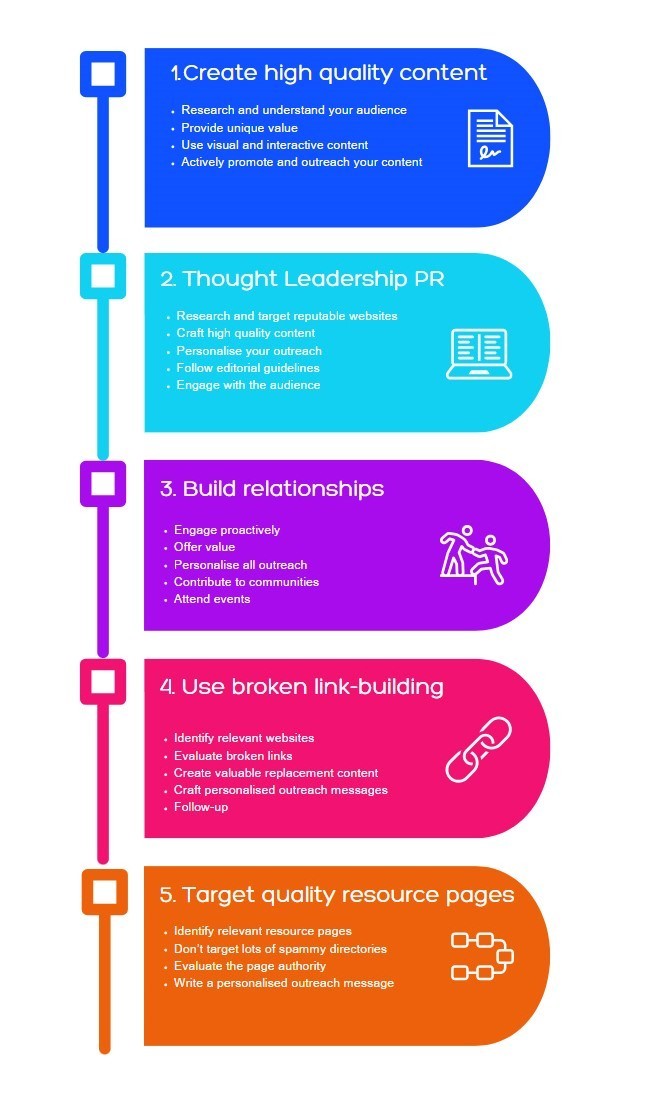How to earn backlinks for your website
Backlinks are fundamental in establishing a website’s credibility and improving its domain authority and search engine visibility. They indicate to search engines like Google and Bing about the reliability, relevance, and quality of your content. Essentially, each (high quality and relevant) link pointing back to your site is a bit like a vote of confidence from other websites, influencing search engine algorithms to consider your content as valuable and worth recommending to users.
Earning these backlinks demands a consistent approach. It’s not just about acquiring any link, but about acquiring high-quality, authoritative links that genuinely add value to your website.
Search engines place significant emphasis on the quality rather than the quantity of backlinks. For example, a handful of links from well-respected, industry-relevant websites will typically hold more weight than numerous links from low-quality or irrelevant sites. Therefore, the focus should be on creating relationships, quality PR, and relevant content that naturally attract these authoritative links.
Successful link building also means you need a solid understanding of your niche and audience. By delivering content that answers their questions, provides solutions, or presents unique perspectives, you increase the likelihood of other websites wanting to reference or link back to your material.
It’s also important to note that building backlinks is not a one-time task but an ongoing process. Regularly updating and promoting your content, engaging with influencers or industry peers, and actively seeking opportunities for collaboration are all key parts of an effective link building strategy.
Here are our actionable strategies and tactics to help you acquire authoritative backlinks for your website:
Create High-Quality Content
A great place to start with earning quality backlinks is with creating valuable and relevant content. Content that educates, entertains, or solves problems is more likely to attract links from other websites. Focus on producing comprehensive guides, insightful articles, infographics, or original research that stands out in your niche. To earn quality backlinks, it’s crucial to produce content that not only resonates with your audience but also compels other websites to reference and link back to it. Here are actionable tips and examples to enhance your content creation for effective link building:


1. Research and Understand Your Audience:
Before creating content, ensure you understand your target audience’s needs, pain points, and interests. Conduct surveys, analyse social media engagement, and explore keyword trends to identify topics that resonate with them.
Example: Suppose you run a fitness blog. Surveying your readers might reveal a strong interest in home workout routines. You can create a comprehensive guide on effective home workouts or an infographic illustrating easy-to-follow exercises.
2. Provide Unique Value:
Stand out by offering unique insights, perspectives, or information that isn’t readily available elsewhere. Be it through in-depth analysis, case studies, or original research, try to provide valuable content that fills a gap in your niche.
Example: If you’re in the technology space, conducting a comparative analysis of emerging gadgets or software solutions could offer unique insights. Present your findings in an article or an infographic that simplifies complex information.
3. Visual and Interactive Content:
Incorporate visually appealing elements like infographics, videos, or interactive tools within your content. Visual aids not only enhance the user experience but also increase the likelihood of other websites linking back to your content.
Example: In the culinary industry, creating a step-by-step video guide for a popular recipe or an interactive tool that helps users customise their meal plans can be highly engaging and link-worthy.
4. Promotion and Outreach:
Once your content is live, actively promote it across various platforms and reach out to relevant websites, influencers, and communities. Share your content on social media, participate in discussions, and personally reach out to any potential link sources.
Example: After publishing a detailed guide on sustainable living practices, actively engage with environmental organisations, eco-conscious influencers, and forums discussing green initiatives. Offer your content as a valuable resource to be referenced.
By consistently producing high-quality, valuable, and share-worthy content that meets your audience’s needs whilst also standing out in your niche or industry, you’ll increase the likelihood of attracting backlinks from other reputable websites. Remember, quality content not only earns backlinks but also enhances your website’s credibility and authority in the long run.

 PR & Thought Leadership
PR & Thought Leadership
Digital PR has grown is popularity in recent years because of its power to drive high quality backlinks and Google’s harsher stance on links from old school practices such as ‘guest blogs’.
While digital PR tactics like reactive PR, newsjacking, and data-led PR campaigns can all be valuable for SEO too, here we’d like to focus on the benefit of thought leadership and contributing articles (such as opinion pieces). While some now slate ‘guest blogging’ for SEO as an ineffective and outdated practice, it’s important to remember that this is not the same thing as high quality thought leadership articles. In years gone by, SEOs would ‘guest blog’ with low quality articles on websites that were essentially set up for link building purposes – this is what Google doesn’t like. This is very different to a link placement in a thought leadership article in a national news website or respected industry journal – the latter can be very beneficial for your SEO strategy ( not least because they’re often from very relevant and high quality publications).
However, it’s important to take a few things into account when taking this approach to link building:
1. Research and Target Reputable Websites:
Start by identifying authoritative websites or blogs within your niche that accept guest contributions. Look for platforms that align with your expertise and audience. Websites with a strong domain authority and engaged readership offer more valuable backlink opportunities. For instance, if you’re in the digital marketing space, contributing to respected platforms like Moz, Search Engine Journal, or HubSpot can provide substantial exposure.
2. Craft High-Quality Content:
When pitching your guest post, focus on creating content that addresses a specific topic or fills a gap in the host site’s content strategy. Ensure your article is well-researched, unique, and adds value to the readers. Share actionable tips, case studies, or personal experiences that resonate with the audience.
For example, if you specialise in finance, an in-depth guide on effective budgeting techniques or investment strategies could be highly sought after.
3. Personalise Your Outreach:
When reaching out to the website or blog owner/editor, make sure you personalise your pitch. Demonstrate your familiarity with their content and explain why your proposed topic would be a great fit for their audience. Highlight your expertise and provide examples of your previous work. A well-crafted pitch significantly increases your chances of getting accepted for a guest post opportunity.
4. Follow Editorial Guidelines:
Adhere to the host site’s guidelines and formatting preferences. Whether it’s word count, tone, or linking policy, make sure your content aligns with their standards. Respecting these guidelines showcases your professionalism and makes the editing process smoother, increasing the likelihood of future collaboration.
5. Engage with the Audience:
Once your guest post gets published, actively engage with the audience by responding to comments and questions. Show appreciation for feedback and encourage discussions around the topic. Engaging with readers not only establishes your credibility but also encourages the host site to consider future collaborations.
By implementing these strategies, you can effectively leverage guest blogging to secure quality backlinks for your website. Consistently providing valuable content to reputable platforms not only improves your site’s search engine rankings but also establishes you as a knowledgeable authority within your industry.
Build Relationships for Link Building
Building relationships for link building is an invaluable tactic that requires time, effort, and a genuine approach. This is valuable, in particular, because it supports your link building PR and link building efforts. To do this you need to:
1. Engage Proactively:
Initiate conversations with website owners, bloggers, and influencers in your industry. Follow them on social media, comment thoughtfully on their posts, and share their content. By demonstrating genuine interest and support, you can start building rapport.
2. Offer Value:
Before asking for a backlink, provide value to your potential link partners. Share their content, offer insights or solutions to their audience’s questions, or collaborate on projects. When you’ve established goodwill, the likelihood of them linking to your content increases.
3. Personalised Outreach:
When reaching out for a backlink, personalise your messages. Highlight specific content on your website that complements theirs. Show them how linking to your content can enhance their readers’ experience or provide additional valuable information.
4. Contribute to Communities:
Participate actively in industry-related forums, groups, or online communities. Answer questions, share your expertise, and contribute meaningfully to discussions. This involvement can lead to natural backlink opportunities as others recognise your knowledge and value your contributions.
5. Attend Events:
Attend conferences, seminars, or webinars within your niche. Engage with speakers, fellow attendees, and industry leaders. Networking at such events can create opportunities for collaborations and backlink possibilities.
Example: Let’s say you run a fitness blog and want backlinks from influential fitness websites. You could start by engaging with fitness influencers on social media. Comment on their workout videos, share their fitness tips, and showcase your enthusiasm for their content. Later, you might reach out and propose a collaboration—a thought leadership article on a trending fitness topic that adds value to their audience. Once the relationship is established, you could subtly suggest the inclusion of a backlink to your related, informative article within your guest post. Similarly, actively participating in fitness forums or attending fitness-related webinars can allow you to connect with trainers, experts, and bloggers. By offering insightful answers to workout queries or sharing your fitness journey, you can naturally position yourself for potential backlink opportunities as others recognise your expertise.
Remember, building relationships for backlinks isn’t just about securing links but establishing mutually beneficial connections. A genuine, long-term relationship can lead to ongoing support, collaboration, and a network of backlink opportunities that strengthen your website’s authority and visibility.

 Use Broken Link Building:
Use Broken Link Building:
Broken link building is a strategy for acquiring valuable backlinks for your website. It involves finding broken links on other websites within your industry or niche and using these opportunities to offer a solution while gaining a backlink in return. Here’s a more detailed look at how you can effectively do this:
1. Identify Relevant Websites:
Begin by identifying authoritative websites within your niche that might have broken links. Tools like Ahrefs can help you scan web pages for broken links related to your content.
2. Evaluate Broken Links:
Once you’ve found broken links on these websites, assess whether the content that was previously linked is similar or relevant to your own. Focus on broken links that align closely with the subject matter or theme of your content.
3. Create Valuable Replacement Content:
Develop high-quality content on your website that serves as a suitable replacement for the broken link. Ensure your content adds value, offers a solution, or provides updated information compared to the original link.
4. Craft Outreach Messages:
Reach out to the website owner, notifying them about the broken link on their site. Politely suggest your content as a replacement, highlighting its relevance and the value it brings to their audience. Personalise your outreach to increase the chances of a positive response.
5. Follow-Up:
If you don’t receive a response initially, consider sending a follow-up message after a reasonable interval. Persistence can often lead to successful link placements.
Example: Let’s use the fitness blog example again, say you find a reputable fitness website that has a broken link in an article about “10 Effective Workout Routines.” Your site hosts a comprehensive guide on “Top 10 Workout Routines for Beginners.” You could reach out to the website owner or editor, expressing your appreciation for their content while mentioning the broken link you discovered. Politely suggest your guide as a replacement, emphasising its detailed approach and suitability for their audience.
The key to successful broken link building lies in offering a sensible alternative solution and demonstrating the value your content brings. Helping website owners fix broken links not only gains you backlinks but also contributes postively to the user experience on their site.

 Participate in Resource Pages (With Caution):
Participate in Resource Pages (With Caution):
The idea here is tot look out for resource pages or link roundups in your industry – and then reach out to the page owners and suggest your content as a valuable addition. Websites often curate resource lists, and if your content is relevant and high-quality, they might include it with a backlink. However, its important to maintain quality control with this approach.
Many will slate directories as an outdated link building tactic that has little (if any) SEO impact – and when people refer to old school business directories and website set up for link building purposes they’re right. However, it is still very important to ensure that the most respected and relevant resources link to your website – especially if you’re starting out.
1. Identify Relevant Resource Pages:
Scout for resource pages, best-of lists, or industry-specific directories that align with your content. Be very selective here to avoid spammy link building practices and remember quality over quantity. Being on a few top resource pages in your industry is better than being on thousands of spammy or low quality directories. Use search operators like “your niche + resource page” or “best of [your industry]” in search engines to find potential opportunities.
2. Evaluate the Page Authority:
Prioritise pages with higher domain authority and a good backlink profile. Tools like Moz’s Domain Authority or Ahrefs’ Domain Rating can help gauge the quality of these pages.
3. Write a Persuasive Outreach Message:
Reach out to the page owner or curator with a personalised email. Highlight the value your content offers and how it complements their existing resources. Be concise, respectful, and specific about why your content would be a beneficial addition.
The key is to offer genuine value to the resource page, showcasing how your content enhances their collection. Personalising your outreach and demonstrating a clear benefit to their audience increases the likelihood of securing a quality backlink from these resource-rich pages.
Leverage Social Media and Online Communities
Engage in discussions, share your content, and participate in relevant online communities or forums. While these links might not directly impact search rankings, they can drive traffic and potentially lead to natural backlinks from interested users.
Monitor your backlink profile, track your progress, and adapt your strategies to stay relevant in your link building efforts.
Implementing these strategies requires patience and persistence. However, by consistently delivering valuable content and engaging with your industry peers, you can gradually earn authoritative backlinks that boost your website’s credibility and visibility in search engines.




